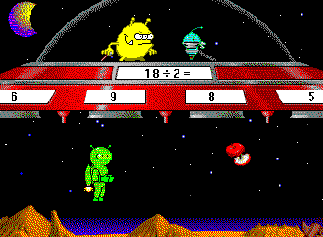

 Pentium90 with 8MB and a 2XCD
Pentium90 with 8MB and a 2XCD
Content
Davison's Math Blaster has been around for over a decade. In its newest incarnation, the Trash Alien has stolen Blasternaut’s pal Spot and our hero is off on a loosely scripted mission to save him. To rescue Spot, the user must solve math problems to complete four steps: collect the trash that the Trash Alien dumped in space, turn the trash to fuel, follow the alien to his home planet, and finally rescue Spot.
In the first activity, the Trash Zapper, the user has to solve math facts problems to earn tractor beams with which to try and zap space-borne recyclables. When 15 pieces have been collected, the user moves on to the Number Recycler activity. Here, the challenge is to create correct equations while recycling unneeded equation variables for later use. From the Recycler, the user moves on to the Cave Runner activity. This activity requires the most mental gymnastics. Here, our hero has a number on his back. To jet his way to the higher levels inside the cave where Spot has been taken, the user must mentally calculate the values of math operations on opposite sides of multiple openings, and choose the opening whose values bracket his own number. Got that? And to make it a bit more challenging, the hero's number changes as he bumps into descending water drops which carry mathematical 'charges.' This one will make your sixth grader work! Finally, our hero encounters the evil Trash Alien in his space ship, and has to confront not only math problems, but floating space trash obstacles.
Ease of Install / Use
Installing Math Blaster was simple on the Mac. Such was not the case for some of our PC-based testers. Several reported installation and running difficulties when they had other program icons on their screen before starting Math Blaster. These memory-related problems were resolved by rebooting their machines, and then launching Math Blaster.
As a video game-type program, Math Rabbit does require hand-eye-mouse-screen coordination. Younger children will be challenged by the trash zapper aiming requirement, the cave runner jet pack controls, and dodging trash in the final activity.
Methodology
“Math Blaster appeals to my daughter as a game, but I know she is getting math practice,” commented one father. Therein lies an important observation about Math Blaster - this is more a math practice program, than a math teaching program. The math practice covers addition, subtraction, multiplication, division, fractions, decimals, percents, estimation, and number patterns, at six different grade levels (1-6). Switching between levels and subjects is simple from within the program at any point during use..
One area that could be improved is feedback. There is almost no feedback during the program, in the form of praise or encouragement. When the user types in the wrong answer three times, or asks for help, math tips appear on the screen. For example, if the user repeatedly enters the wrong answer to a simple addition problem, like 18 + 7 = 24, a tip box appears. In the tip box is a number series from 1 to 30. When the befuddled user clicks on the button "show me," the numbers one though 18 are highlighted, a beep sounds, then the remaining seven numbers, 19 through 25 are highlighted. No audio explanation, no text explanation; just the highlighted number series.
Proxy Parent Value
Kids who are reasonably competent and confident of their basic math skills, were able and willing to use Math Blaster for extended periods of time. Younger children, or those less confident in their skills, found this program too challenging to use on their own.
Best for...
Math Blaster's kid-appeal is as a video game set in outer space. A child not interested in video games or space, is unlikely to respond enthusiastically to Math Blaster.
The program covers a wide range of levels and subjects that will challenge most kids. Don’t plan on your child using this program for six years, though. The math problems change, but the object is the same every time -- rescue Spot. It would, however, be attractive software for a family with more than one child within the recommended age range, because all of the kids could benefit from it.
Bottom-Line
Math Blaster combines a video game approach and math practice to form a useful educational tool. For a child interested in video games, it will encourage the improvement of math skills.
See also:
Reviews of other Math software programs.
![]()
PC |
Macintosh |
|
| Operating System | Win95 or Windows 3.1 or higher | System 7.1 or later |
| CPU Type and Speed | 486/33 MHz or faster | Centris, Performa or better |
| Hard Drive Space | 1 MB | n/a |
| Memory (RAM) | 8 MB | 8 MB |
| Graphics | 256 color monitor, 640 x 480 | 256 color monitor |
| CD-ROM Speed | 2x | 2x |
| Audio | Sound Blaster or compatible | n/a |
| Other Needs | QuickTime SW (incl) | QuickTime SW (incl) |



 Reviews /
Contents /
Sponsors /
Help
Reviews /
Contents /
Sponsors /
Help
Questions or comments regarding this service?
webmaster@superkids.com
Copyright © 1996 Knowledge Share LLC
All rights reserved.